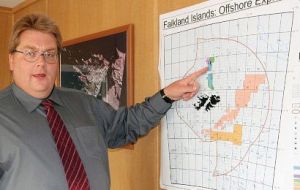MercoPress. South Atlantic News Agency
The Falkland Islands brace for oil wealth; the Norwegian experience
 The discovery “will no doubt be transformational for the Islands, increasing government revenue several times over,” says Stephen Luxton.
The discovery “will no doubt be transformational for the Islands, increasing government revenue several times over,” says Stephen Luxton. By Brian Swint (Bloomberg - Businessweek) - On March 10 and 11, Falkland Islanders voted in a referendum on whether to remain under British rule. Of its 2,563 citizens, only three voted no. The victory set off howls of indignation in nearby Argentina, which fought a brief, disastrous war with Britain over the South Atlantic islands in 1982.
On March 28, Argentine President Cristina Fernández de Kirchner tweeted, “An English territory more than 12,000 km away [from the U.K.]? The idea is not even worthy of a kindergarten of three-year-olds.”
Soon Argentines may have something else to be angry about. The Falklands are no longer just an archipelago of sheep farmers and fishermen at world’s end. A promising offshore oil discovery is expected to bring the British territory 10.5 billion dollars in tax revenue and royalties over 25 years.
The Argentines have threatened to sue any company involved in Falklands drilling, but that hasn’t stopped the Islanders. The Falklands government is starting a wealth fund to manage the cash. On the agenda: paving the main highway from the airport to the capital of Stanley, improving the port so it can accept larger ships, and reimbursing the £60 million (90 million) the U.K. spends annually to defend the islands. “In times of recession, it’s difficult for people in the U.K. to justify spending money on a small population on the other end of the world,” says Andrea Clausen, a Falklands Islander who owns a bus company. “But as long as Argentina claims the Falklands in its constitution, the threat won’t go away.”
The offshore oil discovery may generate government revenues of about 160,000 dollars per person each year when it starts production in 2017, according to London-based consultants Edison Investment Research. That’s equivalent to the after-tax income of a top 1 percent earner in Britain, figures London’s Institute for Fiscal Studies, which researches the impact of taxes and spending. Falkland officials in December visited Norway and the Shetland Islands, which have similar funds to invest their oil and gas earnings. They wanted to know how to avoid inflation and poor financial management. The discovery “will no doubt be transformational for the Islands, increasing government revenue several times over,” says Mineral Resources Director Stephen Luxton.
The field, known as Sea Lion, contains about 400 million barrels of oil, according to Rockhopper Exploration, the explorer that discovered it three years ago. Premier Oil of the U.K. agreed to take over operating the field last year with a 1 billion dollars investment. The Islands can expect to receive 3.9bn in royalties and 6.6bn in tax revenue over the life of the field, according to Edison. Those figures may increase if more oil is found around Sea Lion or if gas finds drilled last year are deemed to be of commercial value. “There’s strong potential for more reservoirs to be discovered and developed,” says Ian McLelland, head of oil and gas at Edison. The money will go mostly to the sovereign wealth fund.
Is it possible to avoid squandering such a windfall, especially for a territory of fewer than 3,000 people? That’s what the Falklanders asked the Norwegians, who in 1990 started what is now the world’s largest sovereign wealth fund. With 4 trillion kroner (715 billion dollars) in assets, it returned 13.4% in 2012. The Falklands fund will never reach that scale, but if the islanders can replicate the Norwegians’ prudent management, they’ll be satisfied. Falklanders, says Clausen, “want to know that our way of life won’t be destroyed.”




Top Comments
Disclaimer & comment rules-

-

-

Read all commentsNo wonder certain prolific posters are so upset on missing out.
Apr 08th, 2013 - 01:41 am 0He/she/they positively reek of sour grapes at missing out on being part of this.
This is an old article but it's still relevant. Some still are drinking the 'falklands oil bonanza“ kool-aid, while many already understand it's a scam, created by the brits (even exxon and shell know that, two giant ”hedge funds“ who are hiding behind the ”we are an oil company” message)
Apr 08th, 2013 - 03:41 am 0http://eyreinternational.wordpress.com/2012/06/21/proof-that-cameron-lied-over-oil-find-in-the-falkland-islands/
Wordpress?
Apr 08th, 2013 - 05:00 am 0PMSL
http://stopalienabductions.wordpress.com is a much better read!
Commenting for this story is now closed.
If you have a Facebook account, become a fan and comment on our Facebook Page!